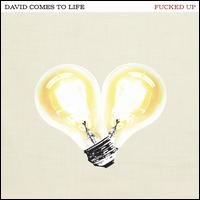 "1-2-3-4!" So goes the rallying cry of the punk rocker, just prior to his or her bandmates launching into their latest one-and-a-half minute, neck-snapping nugget of snot-flicking challenges. Blink and you'll miss it, or as the first CD compilation of early singles by Toronto's Fucked Up proclaimed: Epics in Minutes.
"1-2-3-4!" So goes the rallying cry of the punk rocker, just prior to his or her bandmates launching into their latest one-and-a-half minute, neck-snapping nugget of snot-flicking challenges. Blink and you'll miss it, or as the first CD compilation of early singles by Toronto's Fucked Up proclaimed: Epics in Minutes.
Of course, it's well documented that since that compilation, Fucked Up's recorded output has made a point of ignoring this template in favour of whatever other idea crossed their transom. Collaborations with folk singers and violinists; 18-minute singles; huge pop choruses sung by radio idols—it's all good. And if it angers the same fanbase that once championed them as our city's greatest hardcore hope, all the better. After all, in an era where the term "punk rock" has basically been demoted to Green Day and hair dye for most people, what's more punk than pissing off so-called real punks (and winning government-sponsored awards in the process)? Uh, nothing? Sure.
This has been the main angle behind most of Fucked Up's writing to date, and while I essentially disagree with none of it, I'd prefer to focus on a slightly different on take on their brand of music. For rather than seeing their obsession with toying with punk protocol as just another giant middle finger, I view it as a continuation of Toronto's musical group hug—one that started with Broken Social Scene, Three Gut Records, Wavelength, Blocks Recording Club, and many more about ten years ago. This may be easy for a cynic to mock, but as I'm not one, I see a great correlation between their approach and BSS's vigourous courting of unexpected artists on their albums; or the kitchen-sink experience of a typical night out at Wavelength; or the all-for-one grassroots gang of Blocks. Even further, both BSS's Kevin Drew and FU's Mike Haliechuk have worked hard to establish themselves as finders and promoters of local unsung talent, starting labels as well as managing and producing albums by unsung comrades.
In this respect, 2008's incredible Chemistry of Common Life played like their own You Forgot It In People: a breakthrough album that acknowledged not only the importance of a musical community at large, but the multiplicity of modern listening tastes. Like peanut butter and chocolate, we've long since discovered that different flavours often taste better together, and that part of the joy of listening to music is discovering a new blend for the first time—even if the end result turns out to be unpalatable.
Fucked Up—and the city of Toronto, in general—are far from inventors of this approach. But I think it is fair to say that in a scene as musically disparate as Toronto's, this is as close to an identity as we can claim. Sure, rivalries exist. But years of being the laughing stock of the English-speaking world's music scene meant that we learned to gain strength from each other. Now, David Comes To Life officially designates the band as the new standard bearers of Hogtown to the world. It's hooky (the "Dying on the inside" refrain of "The Other Shoe" is a particularly tenacious earworm), relentless in its length and momentum, full of head-turning guest spots (especially from the honeyed pipes of local folkie Jennifer Castle), and arrogantly confident. For every track beaten bloody by the ferocity of Damian Abraham's feral bark (and most of them are), they all stand tall with moments that directly recall the signatures of both '90s indie (the dizzy climax of "Remember My Name") and classic rock (the chorus of "Running On Nothing").
Then there is, of course, the fact that this record is not only a concept album, but a rock opera, firmly catapulting the band into conversations that involve one of rock's greatest ever groups, The Who. And to be honest, it's here that Fucked Up's reach slightly exceeds their grasp. Tommy is a lot more than just a bunch of songs that lyrically tell a connected story—it's also (most importantly) full of recurring musical motifs that contribute greatly to the overall arc of the entire album. Aside from a slow tremolo noise section that opens David and reappears here and there, the writing here cannot lay claim to such moments—at least not ones that resonate as immediately and deeply as the riff of "Pinball Wizard" or the "See Me, Feel Me" refrain. But hey, if we chastised every band for not being The Beatles, life would be awfully dull.
And so, David Comes To Life is a flawed album, but it's only so because it tries to do more in a single release than most bands attempt in a career. That naked ambition—as well as the contribution it makes to keeping Toronto a relevant and inspiring part of the global music scene—makes it a terrific achievement and one of the year's better albums thus far. A lot of people in this town—and many without knowing it or ever receiving praise—have worked long and hard to make a scene that could foster a band as composed and iconoclastic as Fucked Up. They honour that privilege by continuing to push the local benchmark even further.